 Petzlover
Petzlover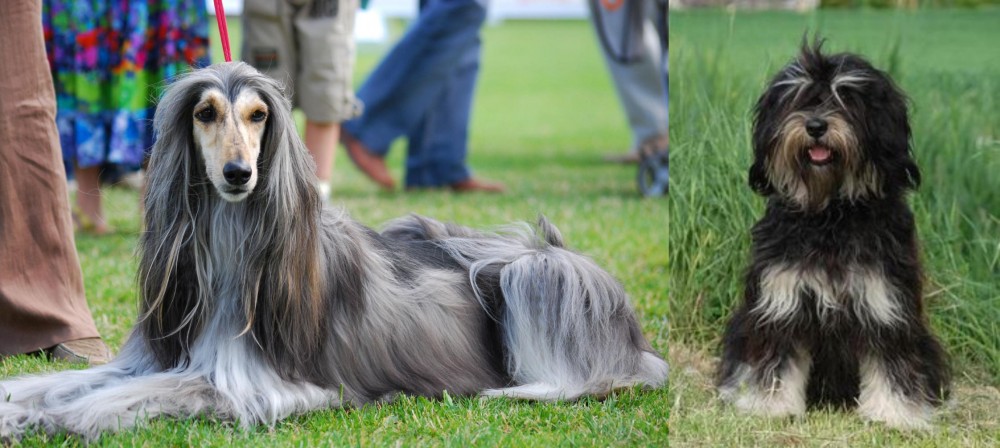 Afghan Hound is originated from Afghanistan but Cao da Serra de Aires is originated from Portugal. Afghan Hound may grow 19 cm / 8 inches higher than Cao da Serra de Aires. Afghan Hound may weigh 7 kg / 16 pounds more than Cao da Serra de Aires. Both Afghan Hound and Cao da Serra de Aires has same life span. Both Afghan Hound and Cao da Serra de Aires has almost same litter size. Afghan Hound requires High Maintenance. But Cao da Serra de Aires requires Moderate Maintenance
Afghan Hound is originated from Afghanistan but Cao da Serra de Aires is originated from Portugal. Afghan Hound may grow 19 cm / 8 inches higher than Cao da Serra de Aires. Afghan Hound may weigh 7 kg / 16 pounds more than Cao da Serra de Aires. Both Afghan Hound and Cao da Serra de Aires has same life span. Both Afghan Hound and Cao da Serra de Aires has almost same litter size. Afghan Hound requires High Maintenance. But Cao da Serra de Aires requires Moderate Maintenance
 The first known information about Afghan Hound was in the 19th century. That dog looked like a Saluki. The breed that we know today is a mix of an Afghan hound accentor which came to Britain in 1920s and other breeds that were popular in that period. Afghan Hound became popular because they were used to hunt big prays in Afghanistan. One of those breeds was Tasy breed. They were very popular among royalty because of its posture and elegance. Their popularity grew very quickly through the whole Europe.
The first known information about Afghan Hound was in the 19th century. That dog looked like a Saluki. The breed that we know today is a mix of an Afghan hound accentor which came to Britain in 1920s and other breeds that were popular in that period. Afghan Hound became popular because they were used to hunt big prays in Afghanistan. One of those breeds was Tasy breed. They were very popular among royalty because of its posture and elegance. Their popularity grew very quickly through the whole Europe.
They were also very popular because they were used to hunt antelopes, gazelles, and snow panthers. In India, English soldiers used them as a mail carrier.
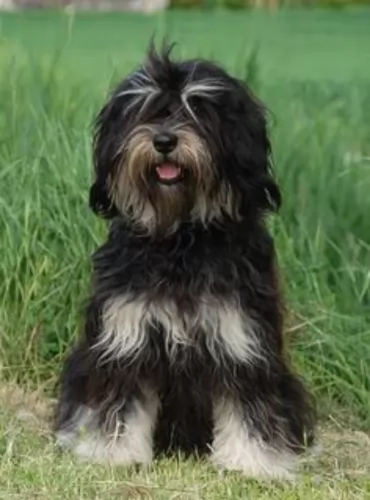 Ancestors of the Cao da Sera de Aires were used for herding livestock in the Serra de Aires and Alentejo, Portugal. This herding dog is native to Portugal and throughout the 20th Century he was kept as a working dog.
Ancestors of the Cao da Sera de Aires were used for herding livestock in the Serra de Aires and Alentejo, Portugal. This herding dog is native to Portugal and throughout the 20th Century he was kept as a working dog.
Known also as the Portuguese Sheepdog, Portuguese Shepherd Dog or Serra de Aires Mountain Dog, there are some questions surrounding the breed's ancestry as there are few records of dogs before 1900. The dog is thought to be related to the Pyrenean and Catalan Sheepdogs and that it has descended from Briards which were imported into Portugal and crossed with the Pyrenean Sheepdog.
The Cão da Serra de Aires breed standard was accepted by the Portuguese Kennel Club, and the breed was recognized internationally in 1996. The dog was also recognized by the United Kennel Club in the Herding Group in 2006.
 The average weight of an adult male is 26-34kg, while females are smaller with an average weight approximately 23 kg.
The average weight of an adult male is 26-34kg, while females are smaller with an average weight approximately 23 kg.
While average height of the Afghan Hound is 68-74cm. Females are slightly smaller with an average height of 63cm.
The lifespan of an Afghan Hound is 12-14 years, but that always depends on the dog to dog. If you have a healthy dog and you take proper care, they tend to live much longer than average lifespan.
Litter Size again variates from dog to dog, but an average litter size is 6-7 puppies.
Afghan hound has many other names, so you might know this breed as Tazi, Tazhi Spay, Da Kochyano Spay, Sage Balochi, Ogar Afgan, Barakzai Hound, Eastern Greyhound, and Persian Greyhound.
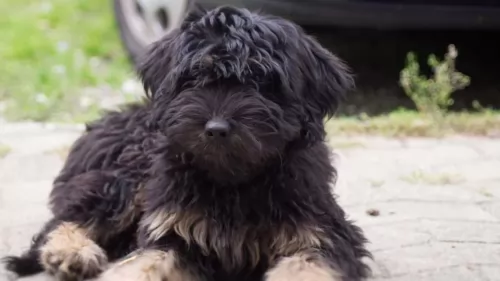 The beautiful Cão da Serra de Aires is a medium-sized dog. He stands at 45 to 55 cm at the withers and weighs about 17 to 27 kg. He is recognizable by the long, shaggy, single-layer coat, of straight or slightly wavy hair. Don’t be deceived by the coat as below, the dog has a muscular, athletic body.
The beautiful Cão da Serra de Aires is a medium-sized dog. He stands at 45 to 55 cm at the withers and weighs about 17 to 27 kg. He is recognizable by the long, shaggy, single-layer coat, of straight or slightly wavy hair. Don’t be deceived by the coat as below, the dog has a muscular, athletic body.
The coat comes in different shades such as fawn, gray, yellow and black. The dog has a long tail which is held straight out or down and he has medium-length, floppy ears. You’ve got to look hard, as the facial features of the dog are hidden by its shaggy coat. He has a lot of facial hair that sometimes you have to wonder if he can see out of his eyes.
The Cao da Serra de Aires is a wonderful canine companion and is devoted and loyal, forming strong bonds with their human family. He is a playful, amicable dog and gets on well with children in the home as well as with other pets.
He is intelligent and trainable, and when properly trained and socialized,he becomes an even nicer pet to have around and is obedient to his master’s voice. He is territorial, strong willed and dominant and makes a good watchdog too.
 Afghan hounds love spending time with one owner or one family. They are not very sociable with other guests. They won’t bark or attack. They simply just don’t enjoy big crowd company. They do not enjoy spending time with children, but if trained properly they will learn to adjust. They simply don’t like quick and sudden movements, but they are not aggressive towards children. They are very independent and intelligent dogs. It is important to be gentle, patient and kind because they love positive training and awards. They are amazing breed with proper owner. Rough handling and punishments will make Afghan hound withdrawn or even depressed. Afghan hound do not tend to please its owner.
Afghan hounds love spending time with one owner or one family. They are not very sociable with other guests. They won’t bark or attack. They simply just don’t enjoy big crowd company. They do not enjoy spending time with children, but if trained properly they will learn to adjust. They simply don’t like quick and sudden movements, but they are not aggressive towards children. They are very independent and intelligent dogs. It is important to be gentle, patient and kind because they love positive training and awards. They are amazing breed with proper owner. Rough handling and punishments will make Afghan hound withdrawn or even depressed. Afghan hound do not tend to please its owner.
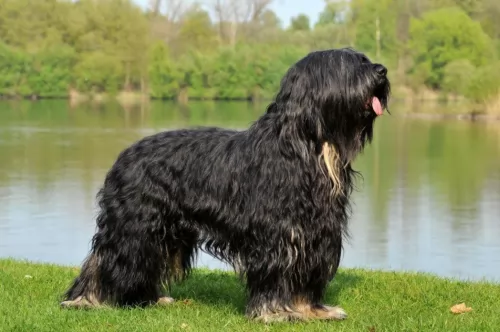 The Cão da Serra de Aires is such a loyal dog to his human family that he makes a splendid pet. He is active, having worked historically at herding and guarding.
The Cão da Serra de Aires is such a loyal dog to his human family that he makes a splendid pet. He is active, having worked historically at herding and guarding.
Socialization and obedience training ensure that he becomes an exceptional pet and he has a host of positive attributes to his name – he is intelligent, energetic, loyal and loving. He may have been used long ago to guard livestock, but today he is selected as a pet specifically for his excellent companionship and for his protective nature.
 Afghan hounds are generally very healthy breed. But, as every breed, they have tendencies to some health problems. If you want to prevent those diseases it is important to select a right and healthy puppy.
Afghan hounds are generally very healthy breed. But, as every breed, they have tendencies to some health problems. If you want to prevent those diseases it is important to select a right and healthy puppy.
Elbow and hip dysplasia are basically common health problem to any big breed. Juvenile cataracts, Cancer and Hypothyroidism are some of the health problems that have been found in this breed, but overall, with proper care and regular vet checks, you will have a happy and healthy Afghan.
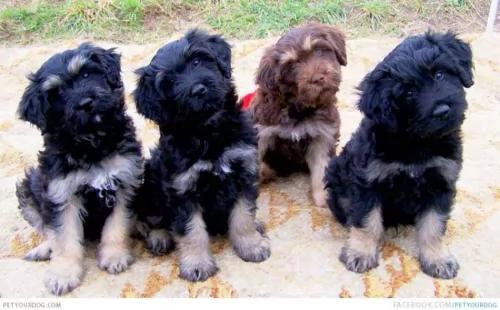 As with most dogs that are looked after well, their health can be good. The Cao da Serra de Aires isn’t likely to keep you at the vet often. Just like with any good dog, there are some health disorders that can benefit you to know about.
As with most dogs that are looked after well, their health can be good. The Cao da Serra de Aires isn’t likely to keep you at the vet often. Just like with any good dog, there are some health disorders that can benefit you to know about.
Being forewarned , you can get your pet to the vet quickly before the illness gets out of hand.
There are some pet owners who want to have their pets tested by the Orthopedic Foundation for Animals as well as the Canine Eye Registration Foundation to rule out health defects such as hip dysplasia and cataracts before they manifest themselves in their pets. This is of particular importance to breeders so as to prevent the parent dogs passing bad genetic conditions to the puppies.
This is a common skeletal disease where the dog’s hip joints don’t develop properly. It can be terribly painful for your pet to get around. It’s a genetic condition and while it is more prevalent in big dogs, any breeds are susceptible.
Your dog will battle along with painful joints and sometimes his hind-end will be lame. You’ll notice that once lying down, he battles to get up again. Fortunately vets are well acquainted with this ailment and they have different options to treat and manage it.
Cataracts in your dog come about from a disease process which affects the lens of the eye. The eye loses its transparency and impairs vision. There are some instances where cataracts can cause blindness. You’ll see a whitish gray area in your pets eye. The most common cause of cataracts is genetics. Get your pet to the vet who will do certain tests to evaluate the eyes and make a recommendation.
 Afghan hound loves eating and 2-2.5 cups of high-quality dry food. It is better if the dog is feeding twice a day. Always depends on the activity of the dog, metabolism, age, size and built. So it is important to observe your dog and to realize what is the best quantity of food.
Afghan hound loves eating and 2-2.5 cups of high-quality dry food. It is better if the dog is feeding twice a day. Always depends on the activity of the dog, metabolism, age, size and built. So it is important to observe your dog and to realize what is the best quantity of food.
Feeding the Afghan puppy should be feed at least 3-5 times per day. It is important to feed your puppy with smaller portions, but more times per day.
Grooming this breed is not very hard, but it requires grooming and taking care of the long coat. Besides a couple of baths, every year and regular everyday grooming will make your dog hair look amazing! Afghan hound is not dog with a lot of requirements.
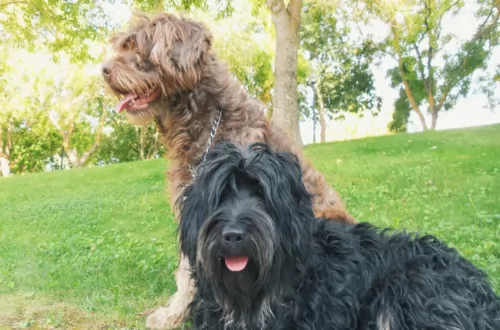 As a working dog used to long hours of action, the Cao da Serra de Aires will need lots of activity. He’ll need you taking him for long walks and playing ball games with him. He can become frustrated and destructive when left without any physical stimulation.
As a working dog used to long hours of action, the Cao da Serra de Aires will need lots of activity. He’ll need you taking him for long walks and playing ball games with him. He can become frustrated and destructive when left without any physical stimulation.
The Cao da Serra de Aires may have long hair but he isn’t high maintenance. He won’t require professional grooming, but will require a good brush a least twice a week. This is because the long coat can tangle.
To keep him looking his best, you’ll want to be trimming the hair around his paws. Another important grooming task is checking his ears and cleaning them. You have to be careful about cleaning your pet ears if you don’t know how, as it could damage the ears. Your vet can always advise you on how this is done.